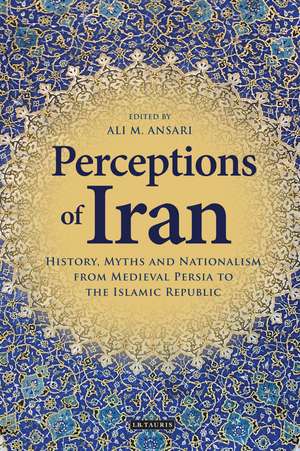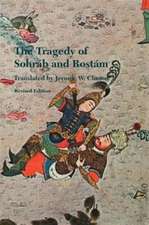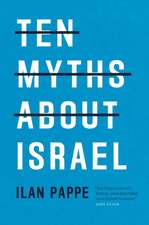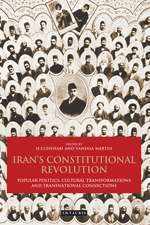Perceptions of Iran: History, Myths and Nationalism from Medieval Persia to the Islamic Republic
Editat de Ali M. Ansarien Limba Engleză Hardback – 27 noi 2013
Preț: 715.34 lei
Preț vechi: 1028.14 lei
-30% Nou
Puncte Express: 1073
Preț estimativ în valută:
136.88€ • 143.28$ • 113.93£
136.88€ • 143.28$ • 113.93£
Carte tipărită la comandă
Livrare economică 31 martie-14 aprilie
Preluare comenzi: 021 569.72.76
Specificații
ISBN-13: 9781848858305
ISBN-10: 1848858302
Pagini: 256
Ilustrații: 8 bw integrated
Dimensiuni: 156 x 234 x 25 mm
Greutate: 0.52 kg
Ediția:New.
Editura: The Iran Heritage Foundation
Colecția I.B.Tauris
Locul publicării:London, United Kingdom
ISBN-10: 1848858302
Pagini: 256
Ilustrații: 8 bw integrated
Dimensiuni: 156 x 234 x 25 mm
Greutate: 0.52 kg
Ediția:New.
Editura: The Iran Heritage Foundation
Colecția I.B.Tauris
Locul publicării:London, United Kingdom
Notă biografică
Ali M. Ansari is Professor in the School of History at the University of St. Andrews. He is the author of several books on Iran, including Iran, Islam and Democracy: The Politics of Managing Change (2000).
Cuprins
Chapter 1: History, National Identity and Myths in the Iranian Contemporary Political Thought: Mirza Fathali Akhundzadeh (1812-78), Mirza Agha Khan Kermani (1853-96) and Hassan Taqizadeh (1878-1970) - Pejman AbdolmohammadiChapter 2: Iran in the Mediaeval Mind - Robert BartlettChapter 3: History and Chronology in Early Modern Iran: The Safavid Empire in Comparative Perspective - Stephen P. BlakeChapter 4: Historiography in Late Antique Iran - Touraj DaryaeeChapter 5: The Growth of historical nationalism and new trend in historiography of Iranian in early twenty century: the Case of Pirniya's Ancient History - Mohammad T. ImanpourChapter 6: Reverse Orientalism: Iranian Reactions to the West - Farhang JahanpourChapter 7: Herodotus' Cyrus and political freedom - Lynette MitchellChapter 8: Iran and the Aryan Myth - David MotadelChapter 9: History and Its Meaning in the Islamic Republic of Iran: The Case of the Mongol Invasion(s) and Rule - Anja Pistor-HatamChapter 10: Safavid Persia through Italian eyes: from reign of freedom to land of oppression - Elisa SabadiniChapter 11: History and the Iranian Drama: The Case of Bahram Beyzaie - Saeed Talajooy
















